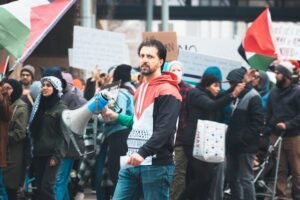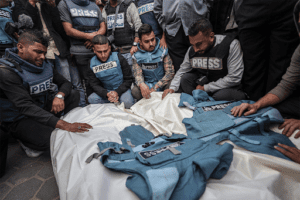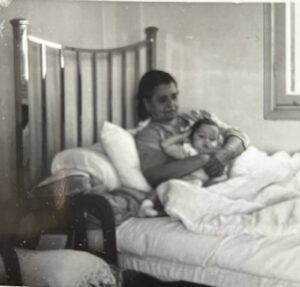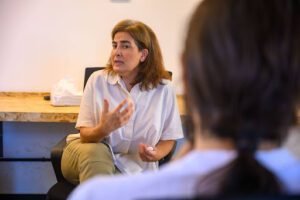To write about my father.. the Palestinian Zanoun Anis Jarrah, who insisted on spelling his name as Dhal-Nun, Johnna, the man of the whale, as mentioned in the Holy Qur’an: “and Dhal-Nun when he went away angry,” to write about all what he was and still is in my mind means recalling many details about the man I always loved, and do not know when I started loving, and cannot remember a day when I didn’t. I may have spent a few hours being angry with him now and then when he harshly disciplined me, but even through those times of anger, I did not stop loving him.
Zanoun – The Father
I must say I had the privilege of being his firstborn, his eldest daughter, who became the guinea pig of his experiments in disciplining children, as he admitted to me years later and bid my forgiveness for the mistakes he may have committed. That made me love him even more because I believe that a daughter’s love, for her father, is based totally on believing in him, and trusting what he says and does. I always believed him and dared to repeat what he said, out of sheer conviction follow his instructions and have the tenacity to say it is true because my dad said so. Whenever I complained to him about my inability to do something, he would simply say to me: “Find a way to achieve what you want, invent it.” That Idea taught me how to be strong in difficult times. During my teen years, I started arguing with him, using his logic to refute his argument. He tried to be strict and clung to his opinion, but eventually, he had to yield and accept the fact that I had grown up, accumulated knowledge, and therefore had something to say worth listening to.
Zanoun – The Palestinian
My father the Palestinian, died in Damascus and was buried in one of its cemeteries, with a handful of Akka’s soil under his cheek. Akka, Acre, summed up all of Palestine for him. It is the city of the Jarrah family where he was born and raised. It is the city that embraces the sea with its mighty wall that eluded invaders throughout its history goes back to the Middle Ages. Even Napoleon Bonaparte failed to invade Akka. Its famous prison witnessed the funeral procession of three martyrs during the Uprising of Al Aqsa in the thirties, Muhammad Jamjoum, Fouad Hijazi and Atta Al-Zeer, and the Palestinian Daluna was singing about them:
And from the prison of Akka, the funeral started
For Jamjoum, Atta, and Fouad Hijazi
The High Commissioner, may God punish him
And may his wife mourn him.
Despite all his immense love for his city, he had to leave it in his early youth to work in the oil pumping stations of the Iraq Petroleum Company, IPC, as a communications engineer to secure the flow of Iraqi oil to the port of Haifa in Palestine, from where it was shipped to the world. These stations, H2 H3 H4, were situated inside Iraq. After a few years, he returned to work in Haifa, and then his work moved to Gaza, where the Iraq Petroleum Company was exploring new oil fields in the region. All of this was before the 1948 Nakba. After the Nakba, the company closed its offices in Haifa and Gaza, and pumping Iraqi oil to Haifa stopped, and my father went back to Iraq, this time working for the Basra Oil Company, BPC, in Basra, Faw, and Zubair.
The Nakba 1948
I was a child who had just celebrated her fourth Birthday in Basra in December of the year 1950 and did not understand what was going on in my father’s mind about being forced out of his country and living in a strange land with a different culture and life. I could see him returning from work sometimes angry with his English boss, Scurry, whom I have borrowed in my novel Rocks of the Shore, in which the main character of the novel is Yunus, the equivalent of Johnna the companion of the whale, Dhal-Nun, based on what I know about my father.
Did my father accept his new life away from Akka in Iraq, or was he in constant search for his Akka in the palm groves of Basra and the shores of Shatt al-Arab? I have to confess that the question never crossed my mind, during my childhood. Perhaps because I was busy getting attached to the new place and mastering the local dialect of Basra, the city that provided me with a place I could call home, and a school and friends. I loved Basra because it was a real place with details that I could recognize and enjoy and not a place that I had to imagine, from the stories that my maternal grandmother told me about my grandfather’s house and mill in the old market in Akka. I must also admit that I never heard my father cry for Akka, or complain about his exile. To me he looked happy, surrounded by friends who came from Basra to visit us in our lovely modern house in Faw, playing his oud and singing the beautiful songs of Muhammad Abdel-Wahhab. A handsome young man in his mid-thirties who was good at playing the oud and singing with a sweet voice, songs based on the lyrics of great Arab poets that excited listeners around him especially when it included words about Iraq, like the one written to celebrate King Faisal the first and mentioning the great river Tigris, composed by the ‘Prince of Poets’ as he used to be called, Ahmad Shawqi, or the famous poem based on the lyrics of the eleventh century Farsi poet Mihyar al-Daylami, which was put to music by Muhammad Abdel-Wahhab on the occasion of the wedding of Princess Fawzia, King Farouk’s sister, to the Shah of Iran.
I loved all that, and I loved my father, the “Palestinian refugee,” who loved Shatt al-Arab, its palm trees, and its friendly people. I enjoyed his playing the oud and singing Muhammad Abdel-Wahhab, which I thought were the only songs. This was a new world with lots of details to discover and learn with a child’s superior ability to learn and relate. I found myself learning the Basrawi dialect and admiring the palm trees around Shatt al-Arab. Full of admiration for Hammurabi, and the winged bull (lamassu), and feeling fully satisfied with what I labelled my discoveries. And amidst all that, I kept the stories of my maternal grandmother, the keeper of the keys, deep in my heart and mind, even though I know her keys do not open a door, but still they are the keys to my grandfather’s house, the house “they stole” from her, along with his mill in the Akka market.
Things started to change with the Egyptian Revolution in the summer of 1952, four years after the Nakba, immigration, and diaspora. My father’s real feelings about what happened four years ago became open. Our house now was full of magazines with pictures of handsome young men in military uniform and hats who were labelled the heroes who would liberate Palestine and make Palestinians return to Palestine, as Count Bernadotte wanted years ago, but our enemies killed him.
I found myself learning new things about Palestine and its people. I began to read everything that came into my hands. The years passed quickly, and my sisters, Amina and Leena, were born. Egypt nationalized the Suez Canal, three enemies attacked Egypt, whom Egypt defeated, and the colonial forces were evacuated from the Land of Kenana. The “Palestinian refugee” became more confident that the dream of returning to Palestine would come true, and Fayrouz sang, “We will return one day to our neighbourhood,” and events continued unravelling. Egypt and Syria united at the beginning of the year in which my brother Nasser was born, and my father became Abu Nasser after years of being Abu Salwa. The Iraqis are good at using a girl’s name in addressing respectfully her father. The High Dam was built with the help of the Soviet Union, a country that the West feared and didn’t want involved in the Middle East at all. The Palestine Liberation Organization was founded under the leadership of my father’s friend Ahmad Al-Shukairi in 1964.
Understanding what was happening on the political front then depended on President Nassir’s speech, which the masses always awaited. The mid-sixties reached their peak. Abdel-Halim Hafez sang, “A picture, we all want a picture” then “Welcome to the battlefields.” But the battle lasted six days only. During the early euphoria, my mother insisted that she was going back to Akka, to my grandfather’s house. I wondered, Akka Mama? Yes, Akka she would say. Can’t you hear what they are saying on the radio? They have reached Akka and Nazareth. I heard and believed. Then I woke up to the setback. My father cried in silence, then applauded Abdel Nasser’s return to the president’s seat. I told him no, I will not forgive anyone for what happened. He said it was a setback. I said no. it is a new Nakba.
After June 1967 I was busy with the last two years at university. And Dhal-Nun fell silent. He began silently following everything that was going on in the front that lost the battle, the war of attrition, the near completion of the High Dam project, and always President Nassir’s speech. He was happy when I graduated from university in the summer of 1969, but he did not celebrate my marriage the following year, as it was preceded by the death of the one in whom he placed all his Palestinian dreams, Gamal Abdel Nasser. I left my family’s house to my husband’s house on October 15, 1970, without celebrations. Sadness over what happened to the Palestinians in what was called Black September and the departure of Abdel Nasser meant we were in mourning.
The birth of my son Ahmad a year later, was what brought joy back to my father. He loved him with all that he missed in the childhood of his children, especially my brother Nasser. He distanced himself from politics and watched Egypt sign a peace treaty with Golda Meir after the October 1973 victory with astonishing silence. He left Iraq in the hands of its new rulers and went to live in Lebanon, and when the war intensified, he took refuge in Syria; he loved living in Damascus. I visited him several times and found him missing Baghdad, crying for Palestine, and calling on the waves of the Mediterranean Sea whenever he stood on its shores in Beirut or Tunisia, to pass his greetings to Akka and the rocks of its shore.
He refused to visit Palestine after the signing of the Oslo Accords. He feared for his memories. My mother was braver and visited Akka. She sat on the wooden bench facing al-Jazzar Mosque in the centre of the old city. She looked around the place and said to my sister Leena: “Now this is Al-Jazzar Mosque, with its Water Fountain, this is my school, Miss Nassar School, and this is Akka Prison. Everything is here just as I knew it, but who are these people?” For a moment there was a real question in her eyes that frightened my sister.
Note
My father published one important book My Country, My Family, and I, in which he narrated the history of Akka, its conquerors, and the history of the Jarrah family, and talked about many details of his life, work, retirement, diaspora and exile, as its title indicates. The book was published by Dar Al-Hassad in Damascus a few months before his death in the summer of 1997, and it left an impact on the people of Akka who read it.











